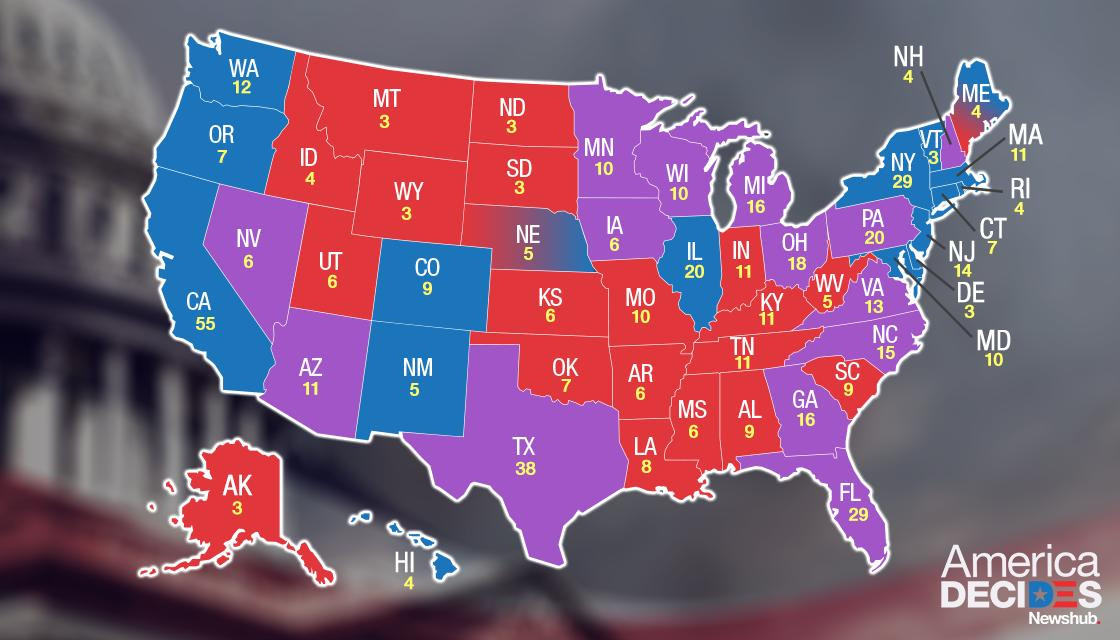The 2024 presidential election isn’t a race for student council president.
And it’s not just because one of the candidates is 60 years old (Kamala Harris) and the other is about two years shy of 80 (Donald Trump). It’s because, as Democrats Hillary Clinton and Al Gore know, the national popular vote does not determine the winner.
The only thing that matters is getting to 270 electoral votes through the Electoral College. This year, if you know the winner(s) in these five states — Georgia, Michigan, North Carolina, Pennsylvania and Wisconsin, and perhaps a sixth, Arizona — you’ll know which candidate has gotten there.
Why is it these five or six states? They all by far have seen the closest polling, and each is worth at least 10 electoral votes.
Let’s start with some basics: 226 electoral votes can be found in the states — along with Nebraska’s 2nd Congressional District and Washington, DC — where Harris has had a clear lead over Trump. Meanwhile, 219 electoral votes seem to be leaning in the former president’s direction.
We take these places off the board because one of the candidates is ahead by 5 points or more in almost all of them.
Now, there’s always the chance of another state shocking us. If Ann Selzer’s Des Moines Register/Mediacom Iowa poll released this past weekend is right, Iowa could be that state. The survey showed Harris at 47% to Trump’s 44% — a finding within the margin of error in a state the former president won by high single digits in both 2016 and 2020.
Of course, if that poll is anywhere close to being right, chances are Harris will do well enough in the battleground states to easily capture at least 270 electoral votes.
Key Swing States To Watch
Looking at those battleground states, Harris has the easier path than Trump to getting to 270 electoral votes. She could win by corralling Michigan (15 electoral votes), Pennsylvania (19 electoral votes) and Wisconsin (10 electoral votes). Victories in those three “blue wall” states would get her to exactly 270.
The polling in these three states is close. An average of recent polling shows Harris with the smallest of advantages in Michigan and Wisconsin (about a point), and the two candidates tied in Pennsylvania. (Other averages might have her slightly further ahead or even slightly behind in those states.)
It isn’t a surprise that Michigan, Pennsylvania and Wisconsin are Harris’ best states of the remaining important ones. These are the three states that Clinton lost by the smallest margin in 2016, and all three helped put Joe Biden over the top in 2020. Harris also seems to be holding up better among White voters than voters of color relative to Biden’s 2020 performance. These states have the highest percentage of White voters of the current battleground states.
But polls are not perfect. Trump could easily win one or more of these three states. Let’s say he wins one of them. Harris could still get to 270 electoral votes by adding another state to her column.
North Carolina: A Toss Up
No state has had more consecutive presidential elections decided by less than 5 points than North Carolina at four straight cycles. And the Tar Heel State is likely to be quite competitive again. Trump seems to have an advantage of about a point in North Carolina right now, according to an average of recent polls.
Importantly, the state has 16 electoral votes. This means that Harris could lose either Michigan or Wisconsin, and easily substitute in North Carolina.
Georgia: A Southern Swing State
The same holds true for Georgia. The Peach State has 16 electoral votes. So why does North Carolina rank ahead of Georgia for me in terms of importance?
After all, Biden won Georgia in 2020, while he lost North Carolina to Trump by a point. The simple explanation is that the polling has been closer in North Carolina this time around. Trump’s been ahead by 1 to 2 points, per the average of Georgia polling over the past few weeks.
And given that the Democratic base in each of these Southern states is highly reliant on Black and college-educated voters, chances are high that any polling error in one state would be seen in the other, too. In other words, Harris would likely have a better chance at winning North Carolina than she would Georgia.
That said, we don’t know for sure that Georgia will vote to the right of North Carolina. And if Harris loses Wisconsin, along with either Michigan or Pennsylvania, she would need both Southern states to get to 270 electoral votes.
Arizona: A State With Potential
You’ll note that I haven’t spoken about either Arizona (the sixth state I teased earlier) or Nevada (a battleground state where the current polling is very tight).
In the case of Arizona, the reason is a combination of two factors: the closeness of the polls and the number of electoral votes. Trump’s strongest state in the battleground polling has been Arizona. He’s up by about 2 points on average over Harris. That’s within any margin of error, but it still makes the state somewhat less appetizing for the vice president.
Additionally, Arizona has 11 electoral votes. Michigan and Pennsylvania both have more. If Harris lost either one, substituting Arizona would not be enough to get her to 270 electoral votes. You’d need another state plus Arizona.
Arizona does at least have more electoral votes than Wisconsin. You cannot say that about Nevada, however, which has just six electoral votes.
Nevada: A Long Shot
While I can draw up scenarios under which Nevada would determine the winner, they would be few and far between. So even though polling in the Silver State is close (within a point), the electoral math lines up in such a way that only in a rare scenario would Nevada truly make the difference.
The Importance of the Electoral Map
Of course, knowing how crazy our politics have been, we can’t dismiss the electoral map. But the bottom line is this election is most likely going to come down to five states … or maybe six.
Both Harris and Trump made repeated visits to these seven competitive states, where CBS News polling showed the candidates were virtually tied in the lead-up to Election Day after a hard-fought campaign.
Seven States That Could Decide The Race
CBS News considers these the battleground states in the 2024 presidential election:
Arizona: A State With a History
Arizona has 11 electoral votes, and its polls close at 9 p.m. ET on Election Day. Trump won Arizona in 2016, but then lost it narrowly to President Biden in 2020.
Georgia: A State with a History of Controversy
Georgia has 16 electoral votes, and the polls closed at 7 p.m. ET. Trump won the state in 2016, but in 2020, Mr. Biden beat him by fewer than 12,000 votes — the first time a Democratic candidate had won the state since Bill Clinton in 1992. Allegations that Trump and more than a dozen allies engaged in a criminal conspiracy to overturn Georgia's 2020 results are now at the center of an election interference case in Fulton County; Trump denies wrongdoing.
Michigan: A Crucial “Blue Wall” State
Michigan's 15 electoral votes went to Trump in 2016 after almost three decades of supporting Democrats for president. The state flipped in 2020, with Mr. Biden taking the win. Michigan is part of the so-called “blue wall” of Midwestern states considered crucial for Democrats. Rep. Debbie Dingell recently said she believes her state will remain competitive until the last vote is counted on Election Day. The first polls in Michigan closed at 8 p.m. ET, but some are in the Central time zone and close at 9 p.m. ET.
Nevada: A State With a Long History of Democratic Victories
Nevada has voted Democratic for the past four presidential elections. With six electoral votes, Nevada has the smallest total of the seven presidential battleground states. Polls close in the state at 10 p.m. ET.
North Carolina: A Tightly Contested Race
North Carolina is still dealing with the devastating aftermath of Hurricane Helene. Both candidates have visited since the storm. Democrats have won the state's 16 electoral votes only twice since 1968, most recently in 2008 when voters backed Barack Obama. Trump edged out Mr. Biden in the state in 2020 by a little more than 1 point, and also bested Hillary Clinton in the state in 2016. Polls in North Carolina closed at 7:30 p.m. ET.
Pennsylvania: A Key Battleground State
Pennsylvania, with its 19 electoral votes, is a critical battleground for Harris and Trump. Mr. Biden took the state in 2020, while Trump won there in 2016. Harris and Trump have visited the state at least 20 times each in the months leading up to the election. Polls in Pennsylvania closed at 8 p.m. ET.
Wisconsin: A State That Has Swung Back and Forth
Wisconsin voters backed Democrats for decades until 2016, when Trump flipped the state and secured its 10 electoral votes. Voters swung back in 2020, when Mr. Biden won the state. The state was decided by less than 1% in the last two elections. Polls in Wisconsin close at 9 p.m. ET.
The Battleground Tracker: A Close Race
CBS News' Battleground Tracker showed a virtual tie between Harris and Trump in these states right up until the end of the 2024 campaign. Estimates are based on CBS News/YouGov polling and analysis.
The findings below also include Nebraska's competitive 2nd Congressional District; Nebraska is one of two states, along with Maine, that allows splitting up its electoral votes.
Battleground States: A History of Tight Races
A battleground state — sometimes known as a swing state — has a population of voters who are almost evenly divided politically heading into the election. While many states vote fairly consistently for either Democrats or Republicans, both parties see a chance to win in the battlegrounds and invest a huge amount of money and time into campaigning in these states.
Here's who voters in battleground states backed in past elections:
Arizona:
Georgia:
Michigan:
Nevada:
North Carolina:
Pennsylvania:
Wisconsin:
Conclusion: A Close Race With High Stakes
The 2024 presidential election is likely to be a close race, and the outcome will likely depend on the results in these battleground states. Voters in these states will have a significant impact on the outcome of the election, and the results will be closely watched by people across the country and around the world.

















